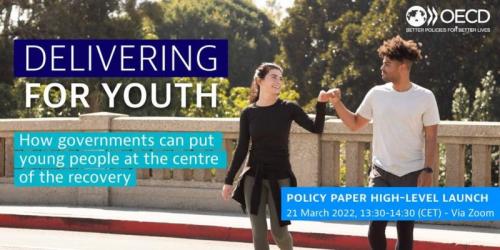
https://oecd.org/coronavirus/en/youth
https://www.oecd.org/coronavirus/policy-responses/delivering-for-youth-h...
Abstract
Governments across the OECD are investing significant resources to address the immediate and long-term effects of the COVID-19 pandemic. Given that the crisis has affected different age groups differently and that its repercussions will be felt by many for decades to come, it is crucial to adopt an integrated public governance approach to COVID-19 response and recovery efforts. This policy brief presents the views of a non-representative sample of 151 youth organisations from 72 countries, including 100 youth organisations based in 36 OECD countries, on how young people have been experiencing the crisis and related government action. It is complemented by an analysis of the measures adopted across 34 OECD countries and provides recommendations on how to deliver a fair, inclusive and resilient recovery for young people through a range of public governance approaches.
Key messages
-
Youth organisations are most concerned about the impact of the COVID-19 crisis on mental health, followed by its impact on education and employment outcomes, familial relations and friendships, as well as the limitation to individual freedoms.
-
More than half of OECD-based youth organisations indicates their members are satisfied with the way in which the government in their country has used scientific evidence to mitigate the pandemic (53%) and has communicated about the risks of the pandemic to their citizens (54%).
-
On the other hand, surveyed OECD-based youth organisations are rather dissatisfied with the way governments have delivered public services for young people during the COVID-19 crisis, notably in the area of sports, culture and leisure (63%), education (60%), housing (56%) and employment (56%), and to a lesser extent in health (46%), transportation and mobility (36%) and justice (33%).
-
Beyond its direct impacts on young people’s wellbeing, youth organisations express concerns about broader societal effects of the COVID-19 crisis. OECD-based youth organisations are most worried about the impact of the crisis on youth rights (72%), inequalities across age cohorts (69%), the spread of disinformation (67%), racial discrimination (61%) and political polarisation (56%). 59% are worried that the crisis may divert government attention away from tackling climate change. 45% express concerns about the wellbeing of elderly and 31% say they are worried about public debt.
-
OECD-based youth organisations express concerns about the lack of opportunities for young people to shape response and recovery measures. Only 15% feel their government considered young people’s views when adopting lockdown and confinement measures. More than half believe financial support schemes (56%) and infrastructure investment responses (54%) have not incorporated young people’s views.
-
More than one in three OECD-based youth organisations (38%) estimate their members’ trust in government decreased since the start of the COVID-19 crisis, whereas only 16% report an increase. Similarly, 31% say their members’ satisfaction with democratic processes has decreased during the same period, while only 15% report an increase.
-
29 of 32 OECD countries with a comparable national response and recovery plan in place include specific policies, programmes or other commitments for young people in their plans, with 10 of them also elaborating how young people have been consulted in the process.
-
24 of 32 OECD countries with a comparable national response and recovery plan in place have put in place measures to support young people in vulnerable circumstances.
-
While nearly all surveyed OECD-based youth organisations have contributed to mitigating the impacts of COVID-19, for instance by organising (online) workshops and running information campaigns, including groups in disadvantaged circumstances, less than a third of OECD countries with a response and recovery plan explain how young people can engage in the delivery of recovery measures.
To better ensure the delivery of a fair, inclusive and resilient recovery for young people, governments can consider a range of public governance approaches, including:
-
Adopting an integrated approach to supporting young people across all relevant sectors -- both through specific sectoral policies and integrated youth strategies at the appropriate level(s) of government -- raising awareness among civil servants about the impact of the crisis on young people and creating mechanisms for cross-sectoral co-operation.
-
Embedding the perspectives of all age groups in response and recovery measures, including in the identification of policy priorities, design of policies, services and (support) programmes, allocation of public resources.
-
Involving young people and youth organisations in building social cohesion and in the implementation of recovery efforts by promoting meaningful volunteer services and youth work through laws, strategies and adequately resourced programmes.
-
Assessing and anticipating the long-term impacts of the crisis across different age groups by improving the collection, use and sharing of data and evidence disaggregated by age and all other identities young people associate with, as well as their intersections, including socio-economic status and geographic area, gender, race and ethnicity, indigeneity, migrant status, (dis)ability status.
-
Building institutional, administrative and technical capacities and skills among policymakers to deliver a fair, inclusive and resilient recovery for young people in line with the recommendations above.










Add new comment